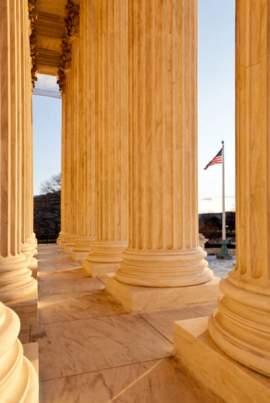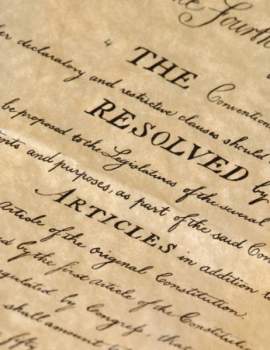
Lemon v. Kurtzman

Lemon v. Kurtzman: The Background
The trial of Lemon v. Kurtzman was a groundbreaking case that took place in Pennsylvania. The case began because the state of Pennsylvania passed a law that allowed the local government to use money to fund educational programs that taught religious-based lessons, activities and studies. This law was passed through the Non-public Elementary and Secondary Education Act of 1968.
The case of Lemon v. Kurtzman was filed by Alton Lemon, a Pennsylvania instructor who claimed that the state had violated the United States Constitution by passing the law mentioned above. Lemon believed that Pennsylvania violated the 1st Amendment to the United States Constitution because the Constitution does not allow the establishment of any state laws or legislation that combine the interests of religious people with the interests of the state’s population. This is known as the Separation of Church and State. The government is not allowed to place the interest of any organization or institution above the interests of the general population. Using these Amendments, Lemon believed that the state of Pennsylvania unfairly funded religious programs that did not appeal to the state’s general population.
Lemon v. Kurtzman: The Case Profile
The case of Lemon v. Kurtzman took place on March 3rd of 1971. Alton Lemon filed the case against David Kurtzman who was the acting Superintendent of the Department of Public Instruction in the State of Pennsylvania.
Alton Lemon believed that preferential treatment of services that are rooted in religion is a direct violation of the Separation between Church and State. Alton Lemon’s main argument was that the state law was a direct violation of the United States Constitution which did not allow religions from benefitting from state laws.
Lemon v. Kurtzman was decided on June 28th of 1971. The case was heard by the Supreme Court of the United States.
Lemon v. Kurtzman: The Verdict
In Lemon v. Kurtzman, the Supreme Court of the United States found that the passing of any state laws that establish a religious body is a direct violation of the United States Constitution. Therefore, in Lemon v. Kurtzman, the Supreme Court of the United States ruled in favor of Alton Lemon.
The verdict in Lemon v. Kurtzman led to the creation of the Lemon Test. This test is a classification system that is used to see whether or not state laws regarding funding or creating religious institutions with public money violate the United States constitution. The Lemon test ensures that the general population’s interests take priority within public institutions and settings. The Lemon test also prohibits the Federal Government from becoming overly religious or involved with a particular religious institution.



















